Afghan Refugee Camp Forcibly Evacuated:
Help RAWA Resettle the Families in Afghanistan
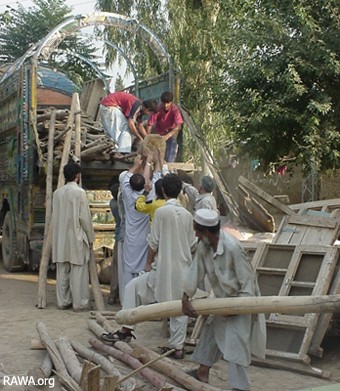
And now Khewa camp is on the brink of closure and hundreds of families look to RAWA for help. Most of the families belong to provinces that border with Pakistan, which are believed to be among the most insecure regions in Afghanistan and many of them have no schools at all.
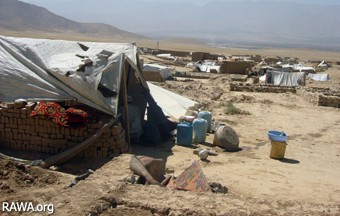
A newly established refugee camp 60 km away from Kabul city where hundreds of families live in hell like conditions. These are Afghans expelled from Pakistan and Iran 6 months ago and still have no access to clean water and live on only bread. As the winter approaches, fear of a human catastrophe comes in at the door of every one of these poor residents.
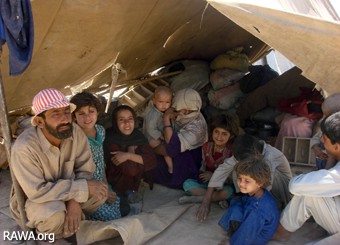
Rafi 2, Farzana 3, Parvana 4, Sharifa 8, Zafar 10, Shakila 13 and Qadir Khan 14 live together with their parents in this worn-out tent. The father is a blind man and the mother is sick but they have to feed these kids at any cost and with no help from the government or others.
The Government of Pakistan has recently ordered the closure of a few Afghan refugee camps in an attempt to force the Afghans to move back to their country. For a majority of these Afghans this was a nightmare moment because they could imagine the difficult situations that would confront them when returning to Afghanistan.
Where to live in Afghanistan when you have no land and money to build a house and the Afghan Government is too weak to help you in this regard? How to find a job there where the unemployment rate is over 60%? How to feed your children with the exorbitant rates where the price of 1 liter of liquid cooking gas is $1.5 and the prices of other commodities are sky-high? How to guarantee the safety of there be a school where your children may study?
The answers to these questions are here:
According the latest report by Afghan government, over 60% of the population live under poverty line, the daily income of most of the people is $1.00; 50% of the population donít have access to drinking water and there are many such heart-wrenching statistics that make life worse for the refugees coming back to their country.
IRC, September 13, 2007: "Afghanistan is sliding ever further into conflict with more than half of the country affected and several regions out of reach of humanitarian aid."
Afghanistan Education Ministry, September 8, 2007: "Taliban unrest shuts nearly 400 schools in Afghanistan; the closures meant that around 200,000 school children would not be able to attend classes in four provinces."
BBC News, November 27, 2006: "More than half of Afghanistan's children are not going to school because of a shortage of places and teachers, the aid agency Oxfam says. Girls in particular are losing out, with just one in five girls in primary education and one in 20 going to secondary school."
Los Angeles Times, Sep.13, 2007: As written by Richard Klein, a former State Department official, "in reality, Afghanistan feels more and more like Sept. 10, 2001, than a victory in the US war on terrorism."
Khewa Camp was one of the refugee camps in Pakistan where RAWA had a substantial presence for over 20 years. This camp later changed to a well-known education and culture centre for Afghan intellectuals. Poets, writers, politicians, artists, doctors, and others settled in this camp to work closely with RAWA. Over 1000 youths were getting an excellent education in this camp. Big sports tournaments at the national level, festivals, functions, theatres and music concerts were held in this camp where thousands of visitors used to come from remote refugee camps.
An Italian supporter of RAWA who visited the camp number of times over the past years calls it "One of the most important social experiments in the world. A factory of democracy and free thoughts."
RAWA appeals to its supporters around the world to help the families of the Khewa camp to have a safe return to their country. The most urgent needs for them are to provide them with tent, some basic supplies like blankets, warm clothes, firewood and digging well for water. UNHCR gives $100 per person for the transportation and some others costs but this is too little to meet their very basic urgent needs.
The table bellows shows some of the needs which we expect to raise enough fund for them:
| Emergency Aids to Afghan Refugees Returning Home | |||
| Expenses | # of families | Unit Cost | Total Cost |
| Tent for shelter | 300 | $195 | $58,500 |
| Digging water well (with pump) | 20 | $2,150 | $43,000 |
| Basic needs for settlement | 300 | $180 | $54,000 |
| Firewood for winter | 300 | $130 | $39,000 |
| Grand Total | $194,500 | ||
You can send your donation to RAWA by any one of the following methods of payment:
For Online Credit Card Donations: http://www.afghanwomensmission.org/help_us/donate.php and make your payment at EMERGENCY RELIEF section.
Please make check or money order payable to IHC/Afghan Women's Mission and mail it to:
The Afghan Women's Mission
P.O. Box 40846
Pasadena, CA 91114-7846
USA
Bank wire transfers: To do a wire transfer to the Afghan Women's Mission, please call AWM's office at (626) 676-7884 to make arrangements.
Or sponsor the children who have been in RAWA schools at Khewa camp. You can do through http://www.chairtyhelp.org/rawa
Thank you in advance for your support.
RAWA
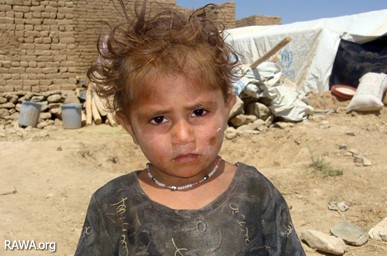 Khalida, 4, and her family were expelled from a refugee camp in Pakistan four months ago. Her father goes daily to Kabul city. He is a waged worker and most of the time comes back without any money at all. |
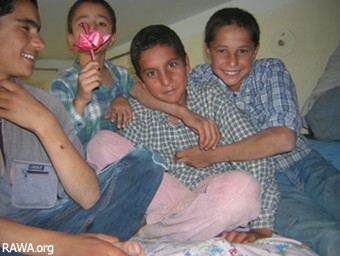 Abbas is one of the boys from this un-named camp who now lives in a RAWA Orphanage and waits for someone to sponsor him through Child Sponsorship Program. |
Afghan Refugee Camp Forcibly Evacuated: RAWA Projects in Danger
Stop Human Catastrophe: Help Afghan Refugees!
[Home] [RAWA in the Media] [Books on RAWA] [RAWA Orphanages] [RAWA Schools] [Photos of RAWA Activities]